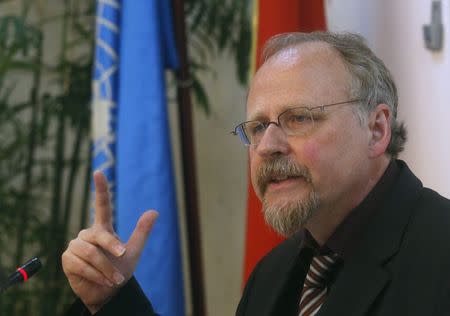U.N. religion expert concerned over 'interrupted' Vietnam visit

By Martin Petty HANOI (Reuters) - A U.N. expert expressed worry on Thursday over "serious violations" of religious freedom in Vietnam following a fact-finding mission he said was interrupted by surveillance, harassment and intimidation. Heiner Bielefeldt, U.N. Special Rapporteur on freedom of religion or belief, said parts of his trip were hampered by interference by unidentified agents, with people he met followed or questioned and others warned or blocked from seeing him. Religion remains under state supervision in mainly Buddhist Vietnam, which has long been accused of suppressing freedom of worship by groups and individuals with faiths not registered or recognised by the communist country's rulers. Bielefeldt said he had seen positive developments in terms of coexistence of faiths and "cautiously widened" space to practice religions, but that was marred by breaches of agreements to guarantee unsupervised access without threats or punishment to those he met. "I received credible information that some individuals whom I wanted to meet with had been either under heavy surveillance, warned, intimidated, harassed or prevented from travelling by police," he told a news conference. "I was closely monitored of my whereabouts ... while the privacy and confidentiality of some meetings could have been compromised." The United States has called on Vietnam to allow greater religious freedom among a series of demands for it to improve its human rights record as Washington tries to build a case for deeper trade and military ties with its former enemy. Vietnam was removed in 2006 from a U.S. blacklist of countries "of particular concern" over curbs on faiths and beliefs, but a U.S. religious freedom watchdog recently renewed its call for it to be put back on. 'NEGATIVE AND DISMISSIVE' The United States wants to capitalise on Vietnam's emerging market potential and court a new ally in Southeast Asia to counter the growing but contentious influence of its communist neighbour, China. Ties between China and Vietnam have recently deteriorated over a territorial dispute in the South China Sea. Bielefeldt said he was disappointed by Vietnamese officials' views on unregistered faiths and beliefs, which he described as a "very negative and very dismissive attitude". He said he had heard allegations during the visit of harassment, house arrest, violence, pressure to renounce faiths and destruction or vandalism of places of worship. Though unable to verify them, he said he could determine abuses took place "beyond reasonable doubt". Bielefeldt was, however, encouraged by government officials' willingness to amend legislation and improve implementation of religion policies, which he described as "extremely limited and extremely unclear", meaning there was scope for abuses by the state as offences were not clearly defined. Vietnamese Foreign Ministry spokesman Le Hai Binh said Bielefeldt's reports of interference were a "misunderstanding". "According to resolution number 5/2 of the Human Rights Council, the host country is responsible for security and absolute safety for the special rapporteur," Binh told a news conference. Eric P. Schwartz, a top member of the U.S. Commission on International Religious Freedom, recommended during a congressional hearing in March that Vietnam be put back on the U.S. blacklist. He said interference during the U.N. expert's visit was not in Vietnam's broader strategic interests. The violations "only underscore the importance of U.S. efforts to promote human rights and religious freedom in Vietnam," Schwartz said in an email to Reuters. "It is important that the Vietnamese government understand that these issues will have an impact on the evolving relationship with the United States, as they should." (Additional reporting by Nguyen Phuong Linh; Editing by Robert Birsel)

